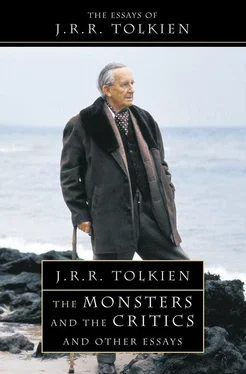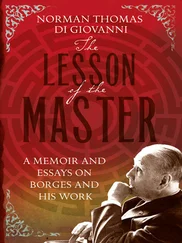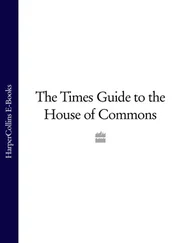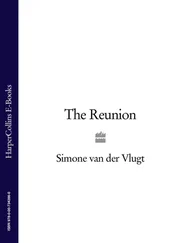THE MONSTERS AND THE CRITICS
and Other Essays
J.R.R. Tolkien
Edited by Christopher Tolkien

CONTENTS
Title Page
Foreword
Beowulf: The Monsters and the Critics
On Translating Beowulf
Sir Gawain and the Green Knight
On Fairy-Stories
English and Welsh
A Secret Vice
Valedictory Address to the University Of Oxford
Footnotes
Also by J.R.R. Tolkien
Copyright
About the Publisher
With one exception, all the ‘essays’ by J. R. R. Tolkien collected together in this book were in fact lectures, delivered on special occasions; and while all were on specific topics, literary or linguistic, the whole audience on those occasions could in no case (save perhaps that of the Valedictory Address) be presumed to have more than a general knowledge of or interest in the subject fn1– and the one piece in this collection that was not a lecture, On Translating Beowulf, was not addressed to experts in the study of the poem. It is this common quality that is the basis of this book (other published writings of my father’s deriving from his studies in early English were articles, not lectures, and were written with a specialized readership in mind); but indeed I think it will be found that all seven papers, though covering a period of nearly thirty years, and on quite different subjects, nonetheless constitute a unity.
In addition to the five pieces that have been previously published I have ventured to include two that have not, though both were publicly delivered. One of these, Sir Gawain and the Green Knight, was my father’s principal pronouncement on the poem to which he devoted so much thought and study. The other, A Secret Vice, is unique, in that only on this one occasion, as it seems, did the ‘invented world’ appear publicly and in its own right in the ‘academic world’ – and that was some six years before the publication of The Hobbit and nearly a quarter of a century before that of The Lord of the Rings. It is of great interest in the history of the invented languages, and this seems a good opportunity and a suitable context for its publication: for it touches on themes developed in later essays in this book.
The first piece in this collection, Beowulf: The Monsters and the Critics, was the Sir Israel Gollancz Memorial Lecture to the British Academy, read on 25 November 1936, and was published in volume XXII of the Proceedings of the Academy (from which copies of the lecture are available). I acknowledge with thanks the permission of the British Academy, owners of the copyright, to reprint it here; and also permission to use the title of the lecture in the title of this book.
On Translating Beowulf was contributed, as ‘Prefatory Remarks on Prose Translation of “Beowulf”’, to a new edition (1940) by Professor C. L. Wrenn of Beowulf and the Finnesburg Fragment, A Translation into Modern English Prose, by John R. Clark Hall (1911).
Sir Gawain and the Green Knight was the W. P. Ker Memorial Lecture in the University of Glasgow, delivered on 15 April 1953. Of this there seems to exist now only one text, a typescript made after the delivery of the lecture (which possibly suggests an intention to publish it), as appears from the statement (See here)‘Here the temptation-scenes were read aloud in translation.’ My father’s translation of Sir Gawain into alliterative verse in modern English had then been very recently completed. This translation was broadcast in dramatized form by the BBC in December 1953 (repeated in the following year), and the introduction to the poem which I included in the volume of translations ( Sir Gawain and the Green Knight, Pearl, and Sir Orfeo, 1975) was taken from the radio talk which followed the broadcasts: this, though very brief, is closely related to the lecture printed here.
There are some minor matters concerning its presentation which must be mentioned. Despite my father’s statement (See here)that ‘where quotation is essential I will use a translation which I have just completed’, he did not in fact do so throughout, several substantial quotations being given in the original. There does not seem to be any significance in this, however, and I have therefore substituted the translation in such cases. Moreover the translation at that time differed in many details of wording from the revised form published in 1975; and in all such differences I have substituted the latter. I have not inserted the ‘temptation scenes’ at the point where my father recited them when delivering the lecture, because if these are given in full they run to some 350 lines, and there is no indication in the text of how he reduced them. And lastly, since some readers may wish to refer to the translation rather than to the original poem (edited by J. R. R. Tolkien and E. V. Gordon, second edition revised by N. Davis, Oxford 1967), but the former gives only stanza-numbers and the latter only line-numbers, I have given both: thus 40.970 means that line 970 is found in the 40th stanza.
The fourth essay, On Fairy-Stories, was originally an Andrew Lang lecture given at the University of St Andrews on 8 March 1939. fn2It was first published in the memorial volume Essays Presented to Charles Williams (Oxford 1947), and reissued (first in 1964) together with the story Leaf by Niggle under the title Tree and Leaf . For this some minor alterations were made, and it is this later text that is given here (with the correction of some errors that go back to the 1964 reprinting).
English and Welsh was an O’Donnell Lecture given at Oxford on 21 October 1955 (the day after the publication of The Return of the King, as noted by Humphrey Carpenter in his Biography, p. 223). These lectures were established in the Universities of Oxford, Edinburgh, and Wales to treat of ‘the British or Celtic element in the English language and the dialects of English Counties and the special terms and words used in agriculture or handicrafts and the British or Celtic element in the existing population of England’; and English and Welsh was the opening lecture of a series given at Oxford. It was published in a collection entitled Angles and Britons: O’Donnell Lectures (University of Wales Press 1963); the copyright is owned by the University of Oxford, whose permission to publish it in this book I acknowledge with thanks.
A Secret Vice exists in a single manuscript without date or indication of the occasion of its delivery; but that the audience was a philological society is evident, and the Esperanto Congress in Oxford, referred to at the beginning of the essay as having taken place ‘a year or more ago’, was held in July 1930. Thus the date can be fixed as 1931. The manuscript was later hurriedly revised here and there, apparently for a second delivery of the paper long after – the words ‘more than 20 years’ (See here)were changed to ‘almost 40 years’; and I have adopted some of these revisions in the text printed. The ironic title in the manuscript itself is A Hobby for the Home (with a later note: ‘In other words: home-made or invented languages’), but my father referred to it in 1967 by a different title: ‘The amusement of making up languages is very common among children (I once wrote a paper on it, called A Secret Vice )’ ( The Letters of J. R. R. Tolkien, p. 374). The words ‘a secret vice’ occur in the essay; and I have adopted this title. At the end I have given a much later version of one of the ‘Elvish’ poems included in the text, since it is one of the major pieces of Quenya (and incidentally upholds the now well-established tradition that all my father’s writings have appendices).
Читать дальше













